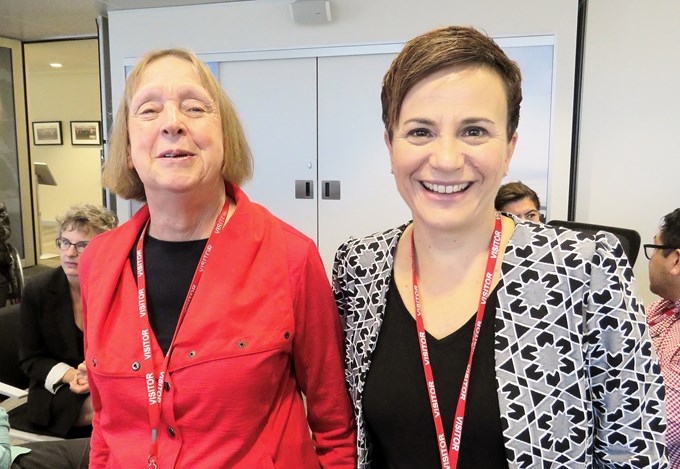Auckland Council’s Community Development and Safety Committee proudly co-hosted its May meeting with the council’s Disability Advisory Panel.
Ongoing concern that a significant lack of accessible housing remains a key issue for disabled people prompted the advisory panel to select 'accessible housing' as the theme of the committee meeting.
Councillor Cathy Casey, chair of the Community Development and Safety Committee, says the presentations helped committee members better understand the importance and need for accessible housing.
“Hearing first-hand about the stress and difficulties people experience when trying to find suitable accessible housing strongly reinforces the importance of universal design which makes homes safer and easier for all to use and occupy without needing to modify a home’s layout,” says Councillor Casey.
"One in ten Aucklanders has a mobility impairment, yet the Building Code does not require private residential developments to be designed in a way that provides access and usability for disabled people.
“Given the scale of growth and the changing needs of Auckland’s diverse population, it is essential to have universal design included in new housing developments."

Mary Schnackenberg, chair of the council’s Disability Advisory Panel, was pleased to openly discuss the topic of accessible housing.
“I’m grateful to the council for picking up the baton and genuinely trying to help improve accessibility, both within homes and between houses and important places in the community,” she said.
In her presentation to the committee, Paula Tesoriero, New Zealand Disability Rights Commissioner, said that getting it right at the start of building projects is the key.
“It’s a matter of luck for someone to find appropriate accessible housing,” says Ms Tesoriero.
“There is a significant shortage of housing available that meets the needs of disabled people. We often see people waiting for years to get housing modifications to make a home suitable for them.
"We need to better spread the word to the people building homes to make them accessible and to ensure universal design is front and centre in urban design,” said the Commissioner.
Ms Tesoriero commended the council for embracing universal design and for the council’s advocacy to central government but says there is still much work to be done.
“Only around five per cent of homes would meet minimum Lifemark standards of accessible design,” she says.
“With around 24 per cent of people living with a disability, access to housing is at the heart of issues for disabled New Zealanders.”
Tricia Austin, Senior Lecturer in the School of Architecture and Planning at the University of Auckland, emphasised the importance of accessibility in a broader term, not solely in relation to housing.
“In an urban context, it is not just about the house. It’s about getting to and from a house and being able to move safely and efficiently in one’s own community.”

What is the council doing?
Universal design makes homes safer and easier for all to use and occupy without needing to modify layouts and the council is working on a range of programmes to promote best practice in universal design in housing.
These programmes and projects include:
- The council’s Auckland Design Manual website provides free online guidance to support architects, designers and property developers to cater for people of all abilities and stages of life when they are designing buildings and public spaces.
- The council’s Auckland Design Office bringing together a forum of organisations interested in Universal Design, as well as design and planning organisations to form the Universal Design Forum. This forum meets six times per year and co-designs the resources for the Universal Design Hub.
- The Universal Design Tool, created by the Auckland Design Office and the Universal Design Forum, provides best practice for mixed-use buildings. Checklists are being created to provide metrics for designers and architects across a range of areas such as parking, stairs, and lifts.
- Universal Design Personas were developed by the Universal Design Forum to identify features in the built environment that benefit different user groups.
- The council continues to champion universal design through conferences and presentations like the Te Ao Tangata Universal Design Conference 2018 where two of four conference streams were dedicated to universal design in housing and neighbourhoods. A Universal Design Award was awarded to Higham Architects for excellence in Universal Design in Housing.
- Universal Design presentations have been held at various public events including Auckland Conversations, Wellington Mayor’s Speaker Series, the Auckland Home Show and Build Expo.
- Universal Design Training sessions are held for Building Control, Design Review, Universities and Professional Bodies.
- Work is also continuing to review and develop standards and strategies and the council is currently working with Panuku Development Auckland to develop their Accessible Housing Strategy.
- Promoting accessible housing through the Design Review process, which involves reviewing developments against the Auckland Unitary Plan and encouraging functionality and accessibility.
- Investigating the re-introduction of provisions in the Auckland Unitary Plan relating to access and universal design for residential developments.
In addition, the council is in the process of making submissions to central government including potential changes to the Building Act to enable accessible housing and a submission on potential changes to the Building Code to regulate for accessible housing.
The council’s Principle Specialist-Universal Design, Elise Copeland, summed up the meeting with a reminder that retrofitting a home to make it more accessible is a significantly more expensive option than building a home based on universal design principles in the first place.


